Chocolate Mill by Wieki Somers at the Vitra Design Museum
Thin layers are gradually shaved away from a cylindrical block of chocolate to reveal the embedded geometric patterns in this installation by Dutch designer Wieki Somers at the Vitra Design Museum (+ movie).
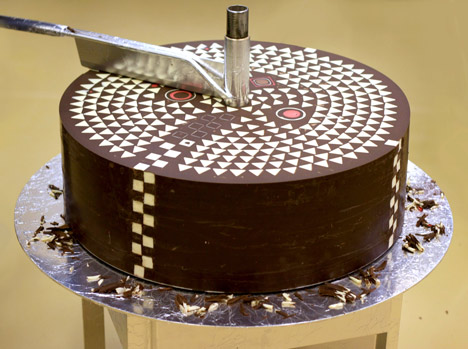
Somers worked with Swiss chocolatier Rafael Mutter to create the Chocolate Mill, which is adapted from a cheese-cutter.
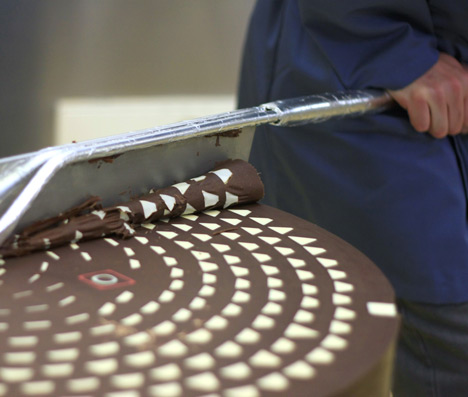
A blade pivoting on the centre of the block is rotated to scrape back one layer at a time, making thin curly shavings to serve to visitors.
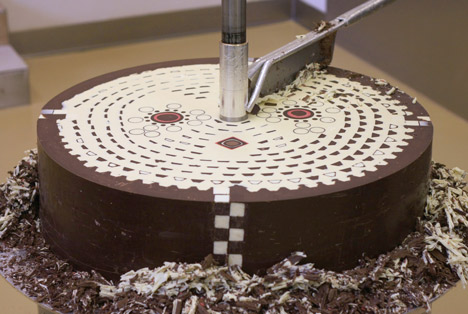
The slab is made up of smaller pieces of different types of chocolate, arranged so that new patterns emerge as the surface wears away.
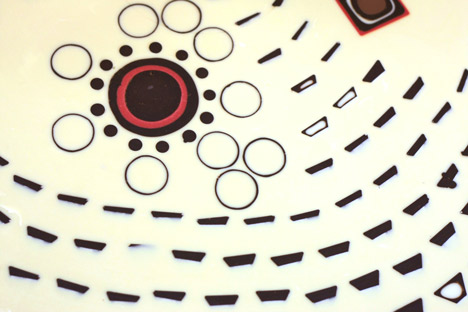
A smaller version of the machine is available in the museum shop.
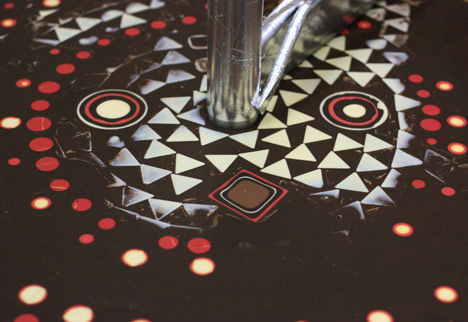
The project is on show until 1 September at the museum in Weil Am Rhein, Germany, as part of an exhibition called Confrontations that pairs designers working in the Netherlands with practitioners of traditional crafts in Switzerland.
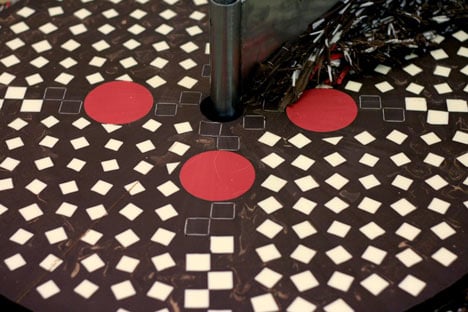
Eindhoven-based duo Formafantasma are also included in Confrontations and worked with a traditional charcoal burner to make tap-water purifiers.
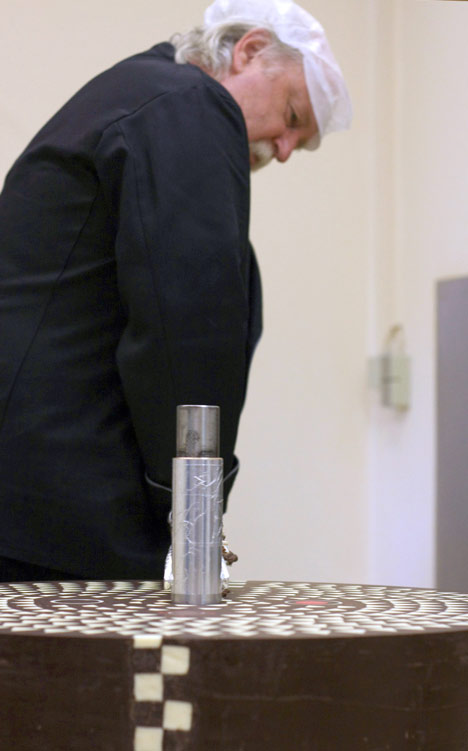
See more stories about chocolate »
See more stories about Wieki Somers »
Here's some more information from Somers:
Against the background of the summer exhibition ‘Gerrit Rietveld – The Revolution of Space’, a special exhibition under the title ‘Confrontations’ opened during Art Basel at the Vitra Design Museum, dedicated to a number of innovative Dutch designers whose experimental methods are similar to Rietveld's. The designers were invited to join a partner from the region in developing a design project. The spectrum of partners ranged from the molecular biology laboratory of the firm Roche to the only female charcoal maker in Switzerland.
Studio Wieki Somers teamed up with chocolatier Rafael Mutter to create the Chocolate Mill, a large cylindrical block of chocolate from which delicate rosettes can be shaved off with a crank-turned blade. Various patterns are integrated into the block using different types of chocolate, creating a flipbook effect as the layers are scraped off.
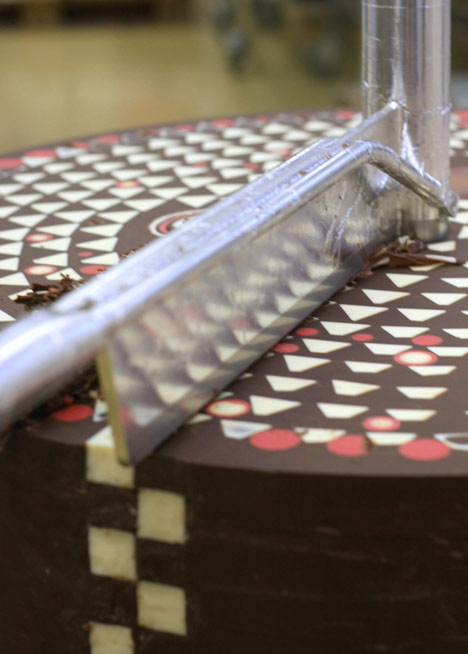
During their performance at June 15, Studio Wieki Somers and the chocolatier prepared chilled drinks for visitors using the chocolate rosettes. Small chocolate mills are on sale in the Vitra shop, including special chocolate for refilling.
Making chocolate out of cocoa beans is a labour-intensive process. But once transformed into chocolate mass, the possibilities seem endless. The fluid mass of chocolate solidifying into different forms is a fascinating process, how it can break and melt again. Nowadays production possibilities can produce new forms of chocolate bars and bonbons by printing, milling, extruding, dripping and spinning chocolate. Solidified sediments, left overs of these processes, can become new chocolates.
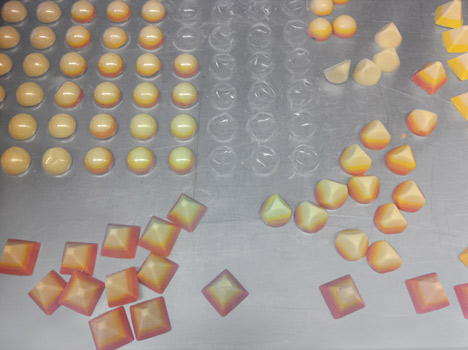
This is the first time we have worked with a material that has such a delicate and direct relationship with its consumer; chocolate stimulates all our senses and our brain at the same time. Nowadays we sometimes forget how astounding it is. It has been a long time since chocolate was a rare substance; a sacred drink, a medicine.
We wanted to inject a new excitement and enjoyment into chocolate by changing some rules and generating a new ritual: a new way of eating and sharing chocolate.
We have created a device, a chocolate carrousel, by adapting a machine used mainly in Switzerland as a cheese slicer. We use it in a different way, as an instrument that mediates between us and the chocolate. We also designed the chocolate which the machine processes, by inserting memories into it like fossils. Thus the three-dimensional aspect of the carrouselis extended by a fourth: time and history translated through movement. By rotating the carrousel's arm, one image appears while another fades away.
There are two animations. The first is a couple spinning in a dance of never-ending pleasure: the carrousel's handle turns like that on a music box. As another layer, we drew upon geometric patterns from Rafael Mutter’s bonbons: by turning the mill you witness a mysteriouskaleidoscopic effect in which African Bobo masks emerge (cocoa pickers believe they have a special power to bring a good harvest). The movement now refers to the magical history of chocolate.
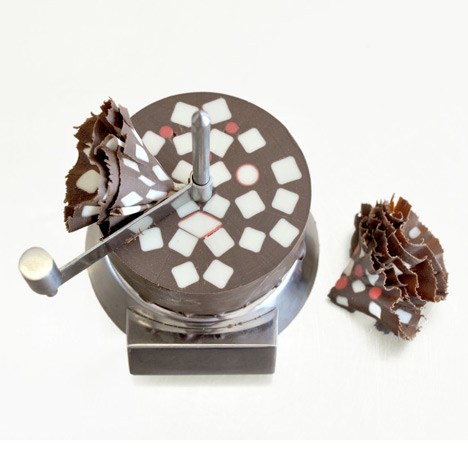
In its new symbolic play, it reminds us of Marcel Duchamp's chocolate grinder, one of the central motifs in his masterpiece, The Large Glass. This complex work has mechanical, symbolic, chemical and erotic associations. We do not intend to match such a broad spectrum of references, but take this device into account as an imprint in our collective subconscious. We want our machine to produce emotions. We want a machine that feels and tastes.
Eating the delicate flowers generated by this process will be a completely new experience of tasting chocolate. Unlike breaking a conventional chocolate bar, the material now becomes so fragile and generous. It is affluence and scarcity at the same time: slicing layers of pleasure.